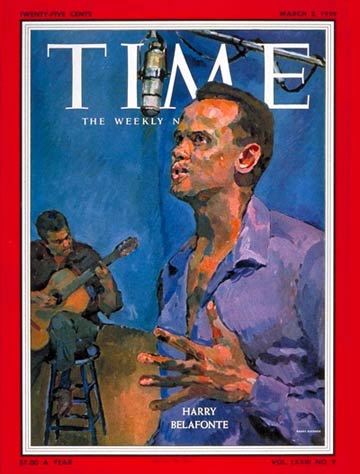
Harry Belafonte
(3 of 8)
In the quieter moods of such a song as Scarlet Ribbons he may stand perfectly straight, his head and shoulders pinned by the spotlight, lips eloquently pursed. In Sinner's Prayer, his face contorts in anguish; in Mark Twain it breaks wide in gutty laughter. When he attacks Love, Love Alone, a comic number, he often throws his arms wide, pivots in an arc from the waist and wobbles his head to the rhythm while he delivers the calypso lyrics with an impudent grin:
/ don't know what Miz Simpson got in
her bone That cause the king to leave his throne.
Having acted the angry descendant of slaves, the chained workman, the devout penitent, the impish lover, Belafonte always returns to being the small boy, performing a shuffling dance between verses, a sort of dark-skinned Huck Finn. At least once during each show he slouches comfortably about the floor directing irrelevant patter at waiters, musicians and ringside patrons ("Don't pay, comrades! Let's make a rush for the door!"). He often finishes by kidding his audience into joining him in a few choruses of Matilda: "Big Spenders be still! Now the intellectuals! EVERYBODY !"
Rattler & Friends. What Belafonte sings is not strictly folk music. He takes folk songs as starters and collaborates with Conductor-Composer Robert Corman, lyric writers and arrangers to make the special regional words and symbols of the songs meaningful to a wide audience. It is an audience he has virtually created for himself, because folk music has never before had mass appeal in the U.S. To protesting purists, Belafonte replies: "All folk songs are interpretations. Otherwise you might as well go back to the first time and say 'ugh.'" He takes a tape recorder with him wherever he goes and the library of his apartment on Manhattan's West End Avenue is crammed with tapes of folk art he has tapped at its source. Near the Brazos River in southeast Texas, he recorded a song about the "rattler," or hound dogs used to track escaped convicts:
Here, Rattler, here
Here, Rattler, here
Old Rattler got to the Brazos
Well, he left him standin' there howlin'
After going through the Belafonte process, the song will appear in a forthcoming RCA Victor album in this form:
Old Rattler is the captain's friend Here, Rattler, here.
Here, Rattler, here.
Nine got away, and he brought back ten.
Several years ago, he became fascinated by the blind street singers of Chicago, particularly one Sonny Boy Williams, some of whose songs he intends to record without changes. In an evangelist church, Belafonte heard a preacher singing, "I'm a soldier of the Lord!" He took the "traditional answer and call" of the song, grafted them on to the lyrics of a Civil War song, Oh! Freedom, and is presenting the results in an album called My Lord, What a Morning. He has recorded rum drinkers in Haiti, "things I heard with Memphis Slim and Lead Belly," a railroad gang in the Florida Everglades:
It takes rocks and gravel, well-a To make a solid road well-a It takes a good-looking woman, well-a To make a good-looking whore, well-a.
